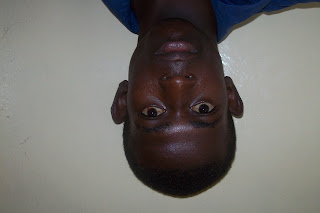 The second day of the workshop, the UMC Human Rights Monitor led the discussion about specific human rights declarations, as well as the relevance of the Liberian Constitution. Many documents were introduced and discussed in detail, such as the Universal Declaration of Human Rights, the UN Convention on the Rights of the Child, Convention on the Rights of Persons with Disabilities, Declaration on the Elimination of Violence Against Women, and the Liberian Constitution.
The second day of the workshop, the UMC Human Rights Monitor led the discussion about specific human rights declarations, as well as the relevance of the Liberian Constitution. Many documents were introduced and discussed in detail, such as the Universal Declaration of Human Rights, the UN Convention on the Rights of the Child, Convention on the Rights of Persons with Disabilities, Declaration on the Elimination of Violence Against Women, and the Liberian Constitution.Participants worked together to understand the language of the various documents. They also were able to have an open conversation on how their own country followed through on these declarations and conventions, as well as addressed the obstacles within themselves and their community to addressing equality.
While these declarations and conventions are signed by the Liberian government, the participants felt the fulfillment of all rights for persons with disabilities is not being met.
This day brought much, somewhat difficult, information, but the consensus was that without having the knowledge of their own rights, they could not move forward as a country and as a people; cementing the fact that they must teach this information to their students.
____________________________________________________________

As I've said in earlier posts, one of the things I wanted to make sure I provided during the workshop was food. With the support of local churches, family, and friends, we were able to provide food in the morning and at midday. For two weeks, I knew that my friends in Liberia were eating more than one meal a day. This helped them to not only live more healthy during those
weeks, but also be able to work and pay attention throughout the workshop. Typically (and I'm sure it started again the day I left), Liberians only eat one meal of rice per day.
There were also leftovers enough to feed some of the students that helped us out, including one student who became my personal photographer for the trip, Mekeh. Mekeh enjoyed taking pictures of himself like this one.




